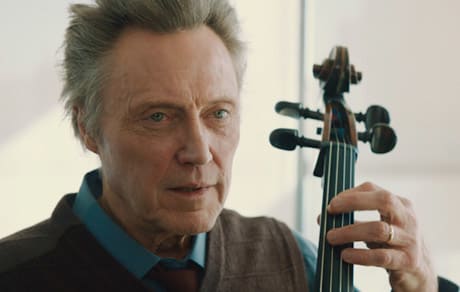"When we've been playing together so long, we all go out of tune in our own unique way." Music teacher and member of renowned classical group the Fuge String Quartet, Peter Mitchell (Christopher Walken) makes the preceding observation to his students regarding Beethoven's insistence that his seminal Op. 131 be played without breaks, but it acts as an apt metaphor for the inevitable disconnect in any long term relationship, be it personal or professional.
First-time fiction director Yaron Zilberman establishes a tense trajectory in the opening shot, with a loaded exchange of looks passing between each member of the Fuge before they sit down to play their season-opening concert. Before a note is played, we're pulled back in time to witness the seeding and gestation of the specific events that brought friends, lovers and co-workers of 25 years to such a tempestuous moment.
A medical diagnosis that spells doom for a passionate profession dependent on fine motor skills causes each of the group members to revaluate their position in life. Issues of ego, love and lust plague married viola Juliette (Catherine Keener), second violin Robert (Philip Seymore Hoffman) and obsessive perfectionist, first violin Daniel (Mark Ivanar). The strong ensemble cast invest in bringing each character's foibles to the surface to be prodded and squeezed to the bursting point.
Giving consideration to, but ultimately selling short, the stakes artists place on ego, the emotional goo that splatters forth takes the form of some salacious melodrama, adding Robert and Juliette's music prodigy daughter, Alexandra (Imogen Poots, Jane Eyre), to the sexually charged melee of passive-aggressive domination tactics.
Zilberman respects the music, using substantial portions of Beethoven's brilliant Late Quartets in the film and always shooting performance scenes with specific attentiveness to accuracy. His visual storytelling, however, with scenes of indistinct editing and meandering cinematography, leaves something to be desired.
Nonetheless, A Late Quartet is an intelligent and engaging juxtaposition of music philosophy with the fragile egos and consuming passions common to group relationships.
(Mongrel Media)First-time fiction director Yaron Zilberman establishes a tense trajectory in the opening shot, with a loaded exchange of looks passing between each member of the Fuge before they sit down to play their season-opening concert. Before a note is played, we're pulled back in time to witness the seeding and gestation of the specific events that brought friends, lovers and co-workers of 25 years to such a tempestuous moment.
A medical diagnosis that spells doom for a passionate profession dependent on fine motor skills causes each of the group members to revaluate their position in life. Issues of ego, love and lust plague married viola Juliette (Catherine Keener), second violin Robert (Philip Seymore Hoffman) and obsessive perfectionist, first violin Daniel (Mark Ivanar). The strong ensemble cast invest in bringing each character's foibles to the surface to be prodded and squeezed to the bursting point.
Giving consideration to, but ultimately selling short, the stakes artists place on ego, the emotional goo that splatters forth takes the form of some salacious melodrama, adding Robert and Juliette's music prodigy daughter, Alexandra (Imogen Poots, Jane Eyre), to the sexually charged melee of passive-aggressive domination tactics.
Zilberman respects the music, using substantial portions of Beethoven's brilliant Late Quartets in the film and always shooting performance scenes with specific attentiveness to accuracy. His visual storytelling, however, with scenes of indistinct editing and meandering cinematography, leaves something to be desired.
Nonetheless, A Late Quartet is an intelligent and engaging juxtaposition of music philosophy with the fragile egos and consuming passions common to group relationships.
